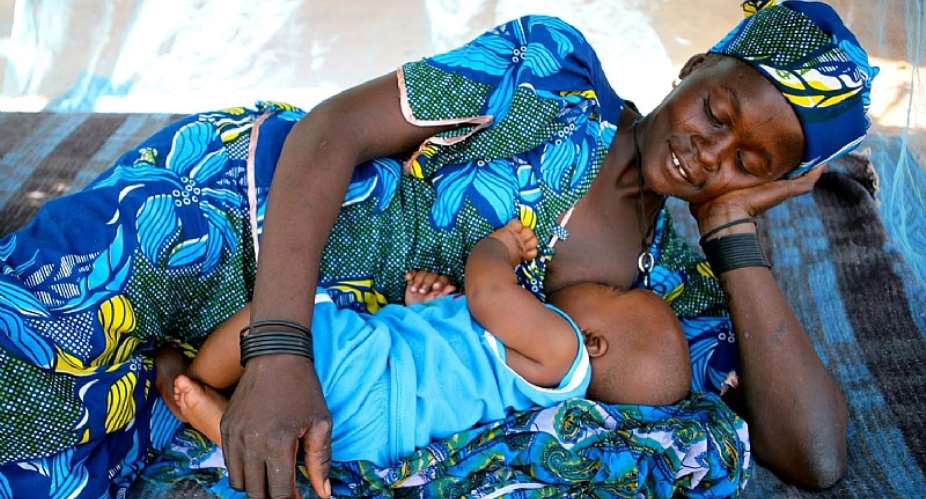The rate at which babies are put to the breast to feed in Ghana for the first six months has remained a little above 50 percent since 2014, the Ghana Health Service (GHS) has indicated.
The country's breastfeeding rate which currently stands at 52 percent, according to the 2014 Ghana Demographic and Health Survey (GDHS), represents a gradual improvement from the 2010 figure of 46.7 percent after a drop from the national figure of almost 70 percent in 2008.
“We were sixth in Africa in 2008, so we need to sustain the drive to get more mothers to breastfeed their babies,” Eunice Sackey, national breastfeeding programme manager, said.
She was speaking at the media engagement on the commemoration of the World Breastfeeding Day under the theme: 'sustaining breastfeeding together' in Accra.
Mrs Sackey spoke about the importance of breastfeeding, especially within the first hour after birth.
She stated that breast milk given to children immediately after birth provides essential nutrients, anti-bodies and skin-to-skin bonding with their mother which nourishes and protects them from disease and death, and keep them warm.
Delayed Breastfeeding
However, about 500,000 new-borns or one in two in Ghana are not put to the breast within an hour of birth, the United Nations Children's Fund (UNICEF) has said.
The children's organisation explained that the longer breastfeeding is delayed, the higher the risk of death in the first month of life among new-borns will be.
Delaying breastfeeding by two to 23 hours after birth increases the risk of dying in the first 28 days of life by 40 percent, delaying it by 24 hours or more increases that risk to 80 percent.
“If all babies are fed nothing but breastmilk from the moment they are born until they are six months old, over 800,000 lives would be saved every year worldwide,” UNICEF document stated.
Even though trends in childhood mortality in Ghana show a decline, more lives would be saved if the rate of early initiation of breastfeeding is improved.
Mrs Sackey, answering questions from the media on the changing trend where mothers are not supported to breastfeed, especially in public, explained that there is a serious missed opportunity for the babies to get the nourishment they need from their mothers.
She, thus, called on health workers, opinion leaders, families and the media to help sustain the drive of exclusive breastfeeding.
By Jamila Akweley Okertchiri





 We’ll protect state wealth from opaque deals – Prof Jane Naana
We’ll protect state wealth from opaque deals – Prof Jane Naana
 Mauritania president says running for second term in June polls
Mauritania president says running for second term in June polls
 I won't ever say I was a mere driver’s mate' — Prof. Opoku-Agyemang
I won't ever say I was a mere driver’s mate' — Prof. Opoku-Agyemang
 2024 polls: 'EC struggling to defend credibility'— Prof. Opoku-Agyemang
2024 polls: 'EC struggling to defend credibility'— Prof. Opoku-Agyemang
 Akufo-Addo gov't's 'greed, unbridled arrogance, unrestrained impunity, sheer dis...
Akufo-Addo gov't's 'greed, unbridled arrogance, unrestrained impunity, sheer dis...
 Election 2024: Ghana needs an urgent reset, a leadership that is inspiring – Ma...
Election 2024: Ghana needs an urgent reset, a leadership that is inspiring – Ma...
 Partner NDC to rollout a future of limitless prospects – Prof Jane Naana Opoku-A...
Partner NDC to rollout a future of limitless prospects – Prof Jane Naana Opoku-A...
 NPP will remain in gov’t till Jesus comes — Diana Asamoah
NPP will remain in gov’t till Jesus comes — Diana Asamoah
 Sunyani Technical University demands apology from former SRC president over sex-...
Sunyani Technical University demands apology from former SRC president over sex-...
 'Dumsor' was resolved by Mahama but ‘incompetent' Akufo-Addo has destroyed the g...
'Dumsor' was resolved by Mahama but ‘incompetent' Akufo-Addo has destroyed the g...
